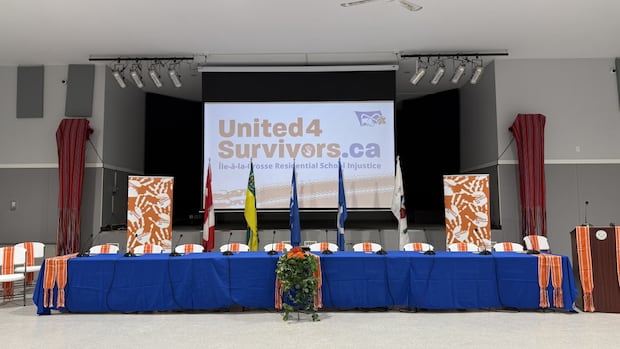The Saskatchewan government is apologizing to former students of the Île-à-la-Crosse Boarding School and has agreed to pay $40.2 million in restitution to them and their families.
Premier Scott Moe travelled to the northern village, about 460 kilometres north of Saskatoon, to announce the agreement in principle on Monday. CBC News is there and will have more coverage as the day continues.
“On behalf of the province of Saskatchewan, I offer a sincere apology to the survivors and their families,” Moe said in a news release. “It is our sincere hope that this agreement provides closure to the former students of the Île-à-la-Crosse School, and that it serves as a foundation for continued collaboration and success in the future.”
The province’s agreement in principle follows one signed earlier this year by the federal government, which has agreed to pay $27 million in compensation and establish a $10-million legacy fund.
The residential school and its legacy have been the subject of legal action for years. Survivors have previously launched lawsuits against both the federal and provincial governments, arguing they should be recognized and compensated for the abuse they endured.
The Île-à-la-Crosse Boarding School was one of the earliest and longest-running institutions of its kind in Canada. It existed in various capacities from about 1860, when it was established by a missionary congregation of the Roman Catholic Church, until the 1970s, when the Île-à-la-Crosse School Division assumed operations.
During that time, an estimated 1,500 children, most of them Métis from northern Saskatchewan, were forced to attend.
Because Île-à-la-Crosse Boarding School pre-dated the federal residential school system, which began in the 1880s, it was not included in the 2006 Indian Residential Schools Settlement Agreement (IRSSA). Survivors were denied compensation given to others across the country, and disputes over whether the federal or provincial government was responsible left them without recognition.
Former students have described widespread physical, sexual and emotional abuse at the school. Children were discriminated against, neglected and prohibited from speaking their languages, including Cree and Michif.
The Truth and Reconciliation Commission of Canada has described the school’s history as “long and complex.”
The $40 million announced on Monday is intended “to promote reconciliation, healing, wellness, education, language, culture and commemoration in the community of Île-à-la-Crosse,” the province said in a news release.
The province said it anticipates the Court of King’s Bench will approve the proposed settlement in early 2026. The claims process will be administered by a court-approved third-party class actions administration firm.







